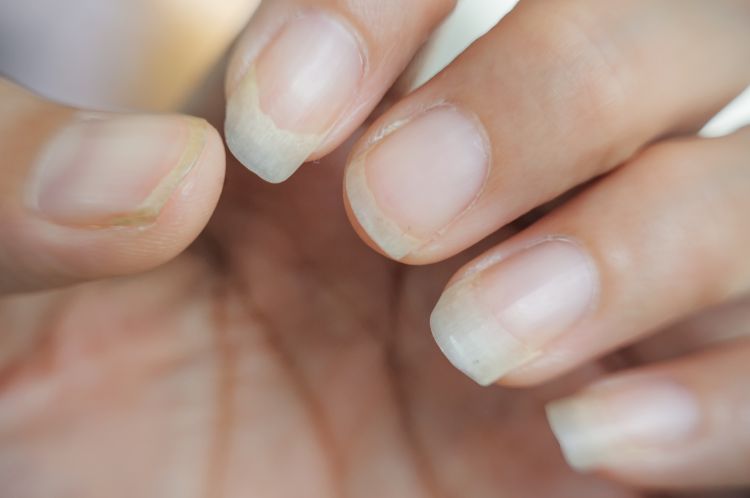Everyone gets a little cold occasionally, right? It's no big deal. So what if your hands turn a pretty shade of purple when you get nervous – don't everybody's?
Having discolored hands is not the norm and is a warning sign that you may be suffering from poor circulation. Having proper blood flow throughout your body helps keep internal organs functioning the way they should. Look through the 12 warning signs below to see if your circulation may be compromised.
Advertisement
1. Tingling hands and feet
When the blood flow to the hands and feet is lost, fingers and toes begin to tingle. This phenomenon is often referred to as "falling asleep," but if you're not sitting on your feet or putting pressure on something to cause the flow of blood to cut off, then WebMD points out that this is a symptom that you may have poor circulation.

DimaBerlin / Shutterstock
2. Numbness
Healthline states that if you lose the circulation to your hands, feet, legs or even buttocks for too long, those areas will feel numb.

Emily Frost / Shutterstock
3. Slow growth nails
Without a proper supply of blood, fingernails and toenails will grow much more slowly, says the Mayo Clinic.

OHishiapply / Shutterstock
4. Dark circles under eyes
Most people associate dark circles under the eyes with lack of sleep, but Doctors Health Press states that they may be caused by poor circulation. To see if that's the case, press on the discoloration. If it turns white before turning dark, then poor circulation may be the culprit.

Sylv1rob1 / Shutterstock
5. Weak immune system
Your blood carries the white blood cells that help fight off the body's invaders. If you suffer from poor circulation, the things that are important for fighting off sickness are not being transported efficiently says Doctors Health Press, so your immune system will be weaker.

ALPA PROD / Shutterstock
6. Sores on feet or legs
Because the feet and legs are at the extremities of the body, if your circulation is poor, your body will have a hard time trying to heal those parts of the body. If that is the case, often you will end up with sores or "ulcers" on the extremities, according to WebMD, that will not heal.

kwanchai.c / Shutterstock
7. Extreme temperatures in hands and feet
A very common symptom for poor circulation sufferers is that their hands and feet are rarely ever "just right." Generally, they are either extremely hot or extremely cold and can be seen in color changes. Extremely hot hands and feet are bright red, whereas extremely cold are a purple-gray, says WebMD.

Andrey_Popov / Shutterstock
8. Hair loss on feet
For women this would be more subtle than for men. Nevertheless, if you suffer from poor circulation, the Mayo Clinic points out that hair loss on the feet and legs may occur.

Andrey_Popov / Shutterstock
9. Varicose veins
The lack of good circulation may make these veins more apparent under the surface of the skin as they will tend to retain more fluid, according to Doctors Health Press.

zlikovec / Shutterstock
10. Digestive problems
Blood is necessary to help digest food. Doctors Health Press points out that if you suffer from digestive problems, you may have circulation trouble. The blood may be having difficulty getting to the stomach to aid in digestion and may leave you instead with diarrhea, stomach pains or nausea.

Roman Samborsky / Shutterstock
11. Fatigue
If your circulation isn't working right, then the oxygen and nitrogen and other minerals your body needs to function properly is not getting carried throughout it via the blood, notes Doctors Health Press. It instead hoards what it has, leaving you feeling like you've run a marathon.

Lolostock / Shutterstock
12. No sex drive
WebMD and Doctors Health Press both share that the reproductive organs of both men and women require a lot of blood. If your circulation is moving slowly, the sex drive seems to just peter out too.

El Nariz / Shutterstock
Advertisement
Having poor circulation affects more than just your hands and feet. It affects your mind, your stomach, your overall health and more. If you think you have a circulation problem, be sure to see a doctor to get help on how to treat the problem so it doesn't interfere with your quality of life.

